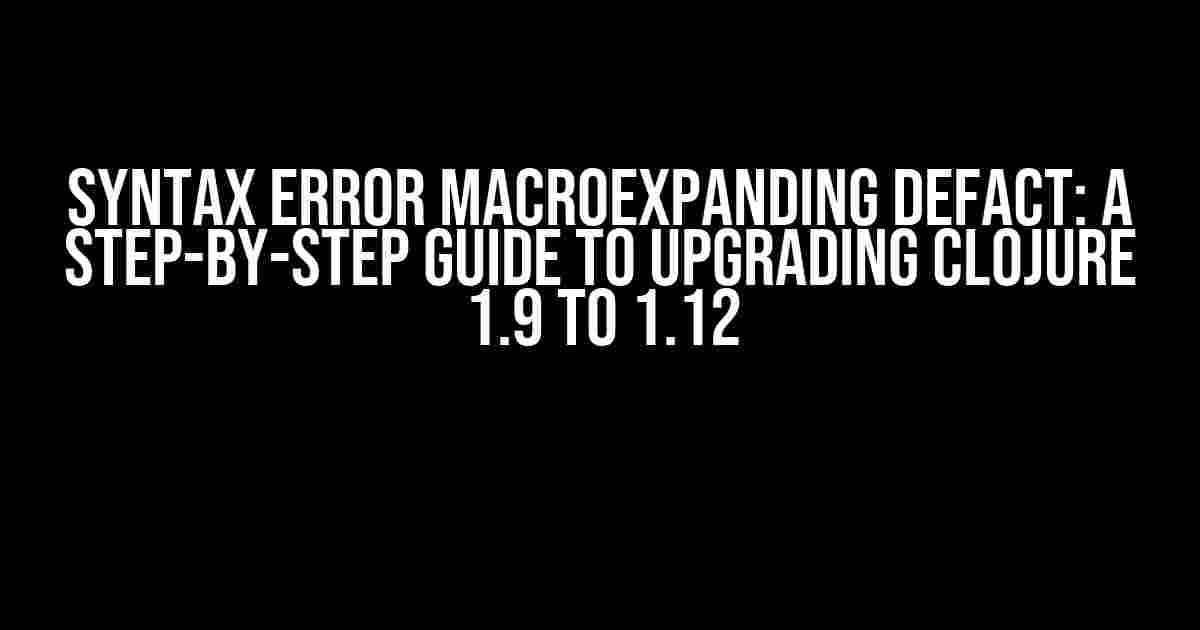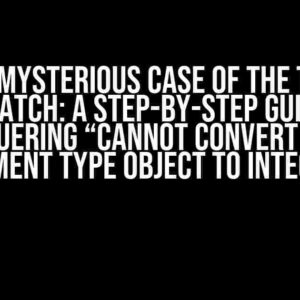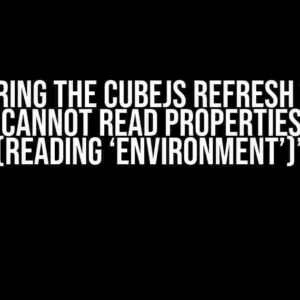Are you tired of encountering the dreaded “Syntax error macroexpanding defact” error when trying to upgrade your Clojure project from 1.9 to 1.12? You’re not alone! In this comprehensive guide, we’ll take you by the hand and walk you through the process of resolving this pesky issue and successfully upgrading your Clojure project.
Understanding the Error
Before we dive into the solution, let’s take a step back and understand what’s causing this error in the first place. The “Syntax error macroexpanding defact” error typically occurs when Clojure’s macroexpansion process encounters an issue with the `defact` macro. This macro is part of the `clojure.test` namespace and is used to define a fact, a type of test assertion.
(defact [...])
In Clojure 1.9, the `defact` macro was part of the `clojure.core` namespace, but as of Clojure 1.10, it was moved to `clojure.test`. This change can cause issues when upgrading your project, leading to the syntax error.
Preparing for the Upgrade
Before we start the upgrade process, make sure you have the following prerequisites in place:
- Clojure 1.9 project with the `defact` macro in use
- Clojure 1.12 installed on your system
- A code editor or IDE of your choice
- A cup of coffee (optional, but highly recommended)
Step 1: Update Your Dependencies
The first step is to update your project’s dependencies to use Clojure 1.12. You can do this by modifying your `project.clj` file:
(defproject my-project "1.0.0"
:dependencies [[org.clojure/clojure "1.12.0"]]
:plugins [[lein-clojure-lint "0.1.5"]])
Update the `org.clojure/clojure` dependency to version `1.12.0` or the latest available version. Save the changes and reload your project.
Step 2: Update Your Namespace Declarations
Next, we need to update the namespace declarations to reflect the changes in Clojure 1.10+. Specifically, we need to add the `clojure.test` namespace to our test files:
(ns my-project.core-test
(:require [clojure.test :refer :all]))
Add the `clojure.test` namespace to each of your test files, making sure to update the `:refer` clause to include the `:all` symbol.
Step 3: Update Your defact Macros
Now it’s time to update the `defact` macros to use the new `clojure.test` namespace:
(ns my-project.core-test
(:require [clojure.test :refer [deftest testing is are]]))
(deftest my-test
(testing "some test"
(is (= 1 1))))
Replace each occurrence of `defact` with `deftest`, and make sure to update the namespace declarations to include the `clojure.test` namespace.
Step 4: Run Your Tests
Finally, run your tests to ensure everything is working as expected:
lein test
If you’ve followed the steps correctly, you should see your tests passing without any issues.
Troubleshooting Common Issues
While upgrading your project, you may encounter some common issues. Here are a few troubleshooting tips to help you overcome them:
| Issue | Solution |
|---|---|
| Error: ” Unable to resolve symbol: defact “ | Update your namespace declarations to include the clojure.test namespace. |
| Error: ” Syntax error macroexpanding defact “ | Replace defact with deftest and update your namespace declarations. |
| Error: ” Could not find function: defact “ | Make sure you’ve updated your dependencies to use Clojure 1.12. |
Conclusion
Happy coding, and welcome to the world of Clojure 1.12!
Frequently Asked Question
Upgrading Clojure from 1.9 to 1.12 can be a breeze, but sometimes, a syntax error macroexpanding defact can throw a wrench in the works. Don’t worry, we’ve got you covered! Here are some frequently asked questions to help you overcome this hurdle.
What is the syntax error macroexpanding defact, and how does it relate to upgrading Clojure?
The syntax error macroexpanding defact occurs when there’s an issue with the expansion of the defact macro, usually due to version incompatibilities. When upgrading Clojure from 1.9 to 1.12, some macros and dependencies might not be compatible with the new version, causing this error. It’s essential to identify and update the problematic dependencies to resolve the issue.
How do I identify the problematic dependencies causing the syntax error macroexpanding defact?
To identify the problematic dependencies, start by reviewing your project’s dependencies and plugins. Look for any dependencies that haven’t been updated to support Clojure 1.12 or have known issues with the new version. You can also check the Clojure ChangeLog and release notes to see if there are any specific updates or breaking changes that might be affecting your project.
What are some common dependencies that may cause issues when upgrading to Clojure 1.12?
Some common dependencies that may cause issues when upgrading to Clojure 1.12 include clojure.java.jdbc, clojure.tools.logging, and clojure.walk. Additionally, some plugins like lein-ring and lein-ancient might need to be updated to support the new version of Clojure. Be sure to review the documentation and changelogs for each dependency to ensure compatibility.
How do I update my project to use the latest versions of dependencies compatible with Clojure 1.12?
To update your project, start by updating your project.clj file to use the latest versions of dependencies. You can use the clojure command or lein to update your dependencies. Additionally, you can use tools like depstar or depgraph to visualize and manage your dependencies. Make sure to test your project thoroughly after updating to ensure compatibility and resolve any new issues that may arise.
What if I’m still experiencing issues after updating my dependencies and plugins?
If you’re still experiencing issues after updating your dependencies and plugins, it may be worth seeking help from the Clojure community or a seasoned developer. You can post your issue on forums like Clojure subreddit, Clojure mailing list, or Stack Overflow, or consider hiring a professional to help you resolve the issue. Don’t be afraid to ask for help – the Clojure community is known for being friendly and supportive!



